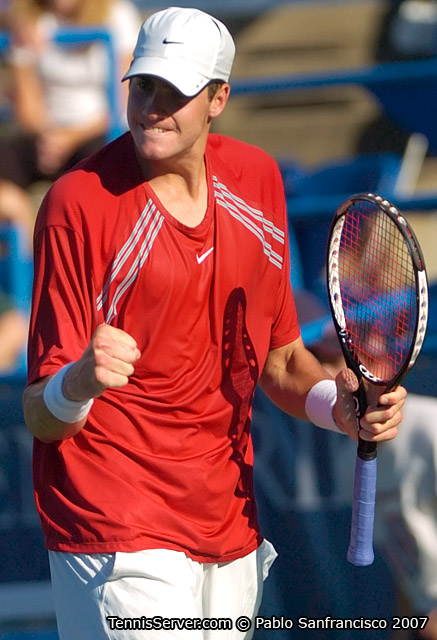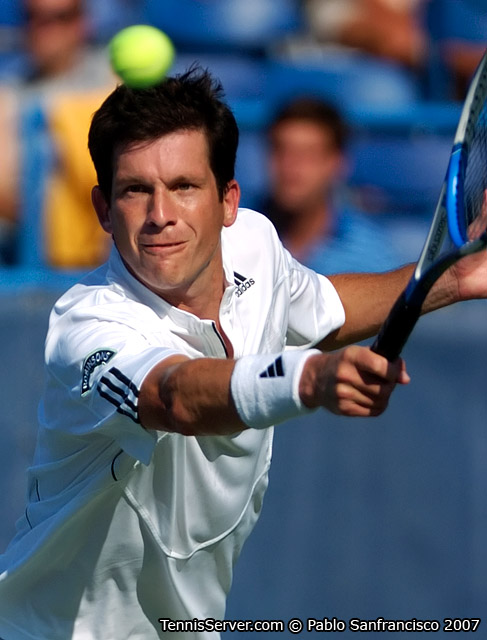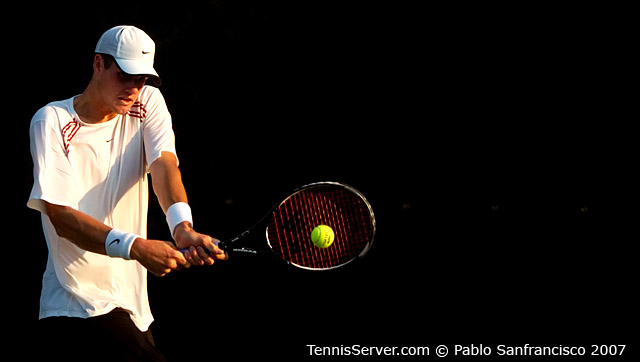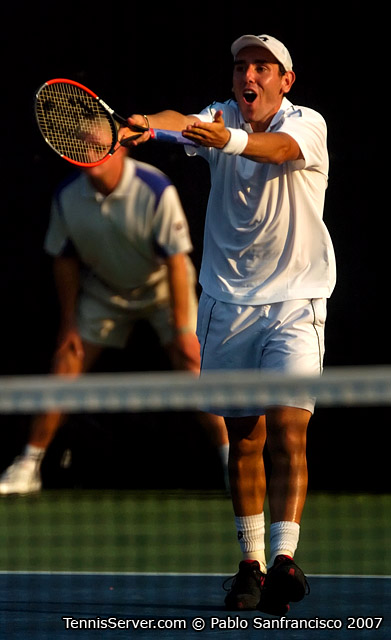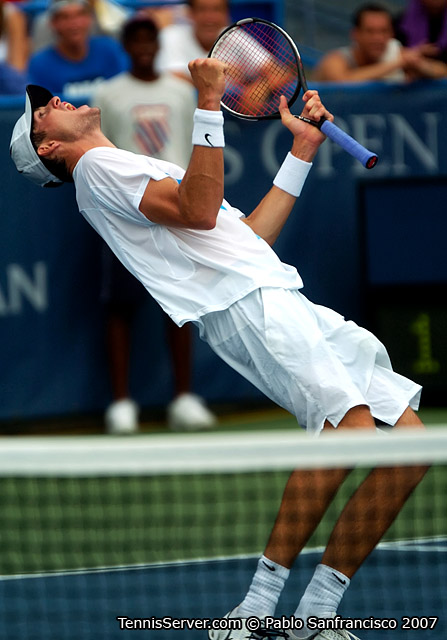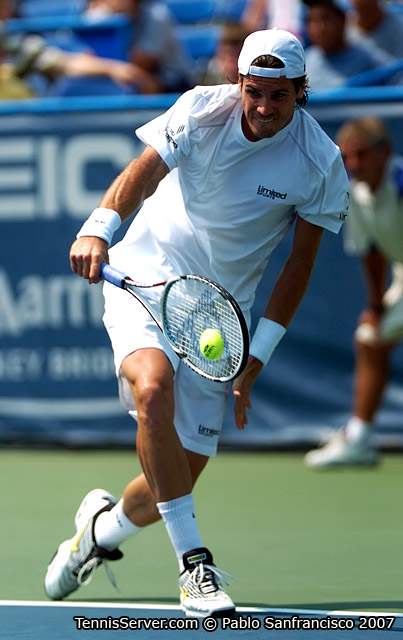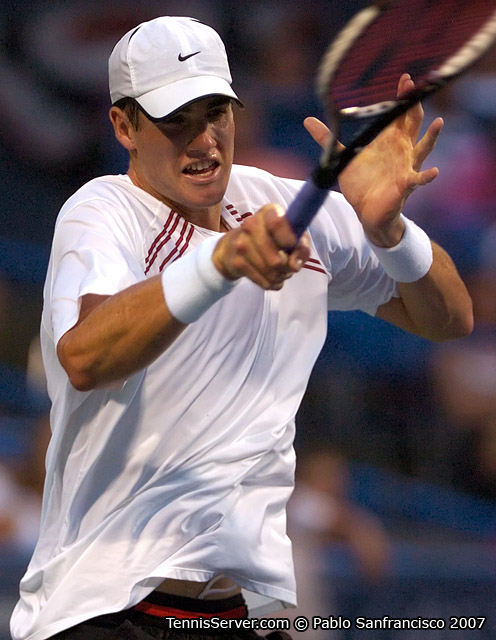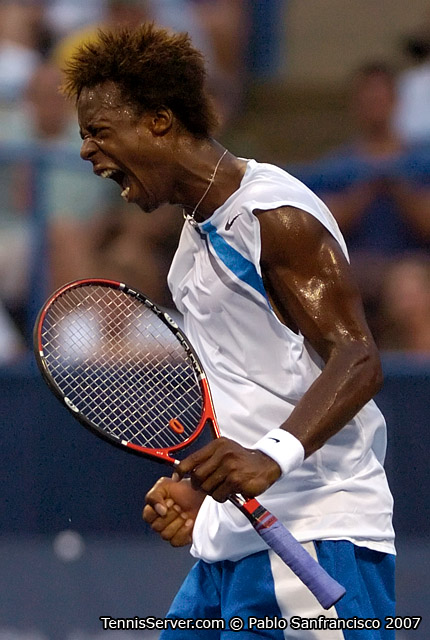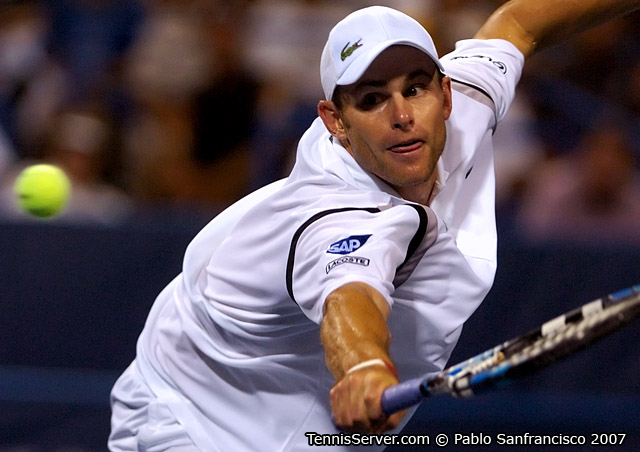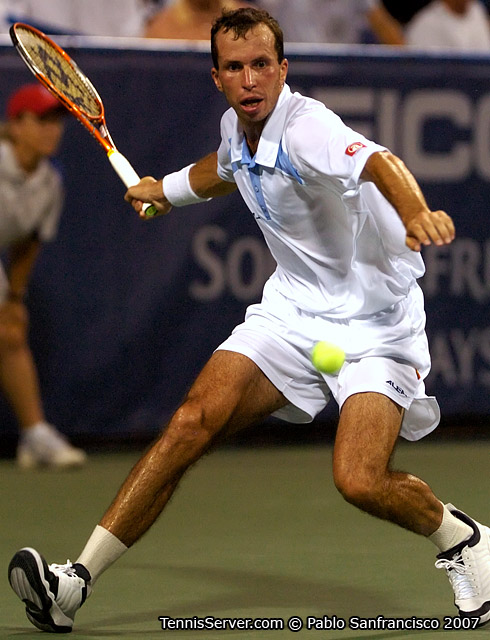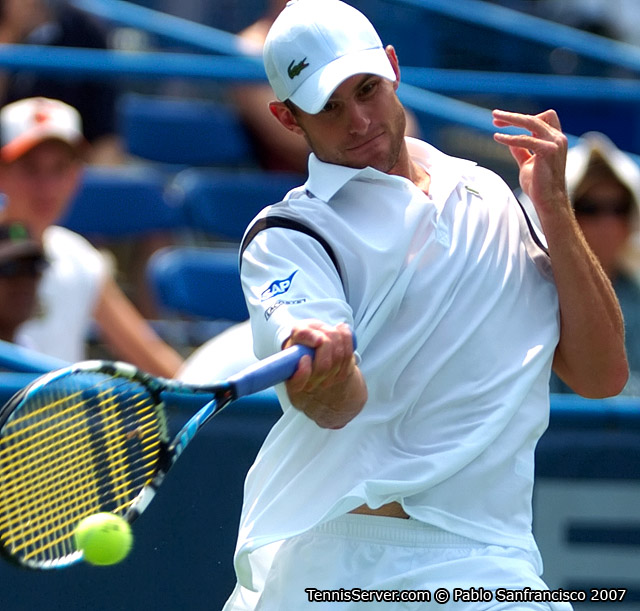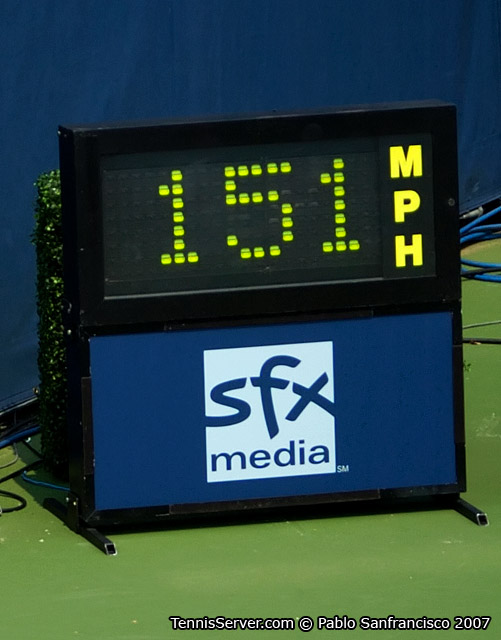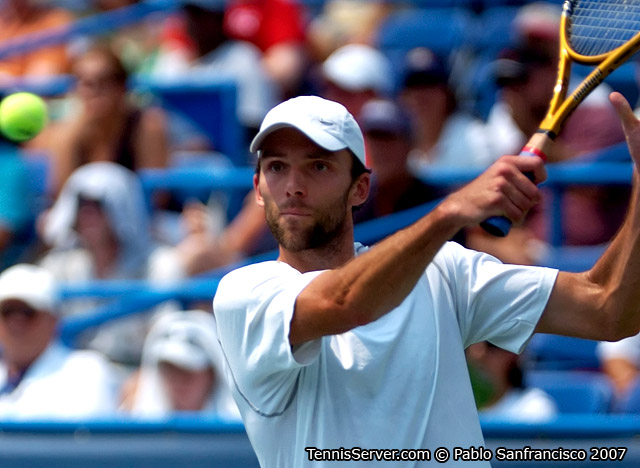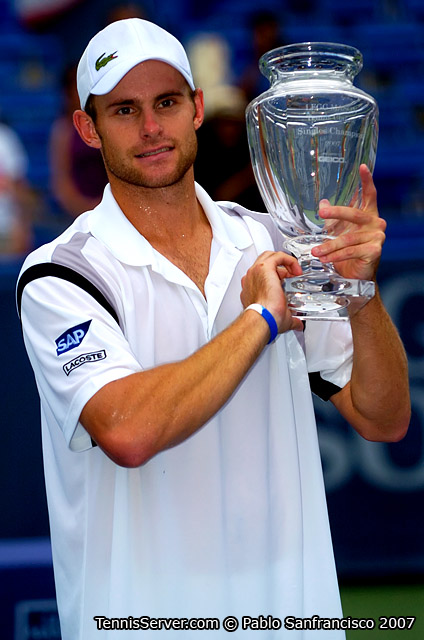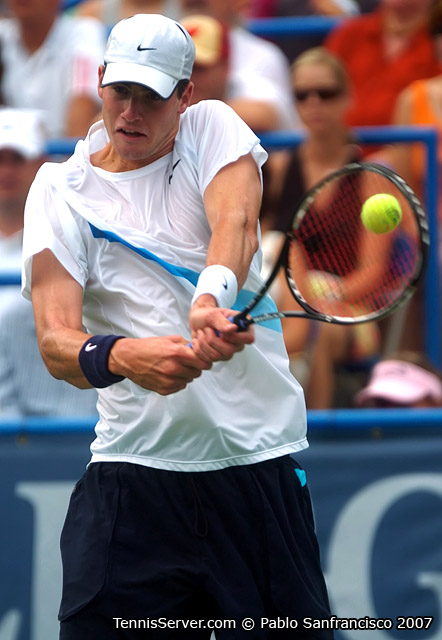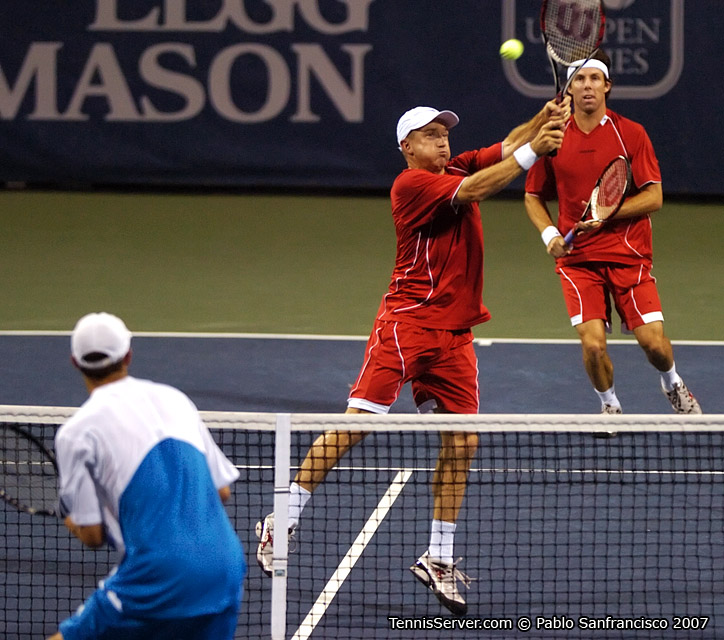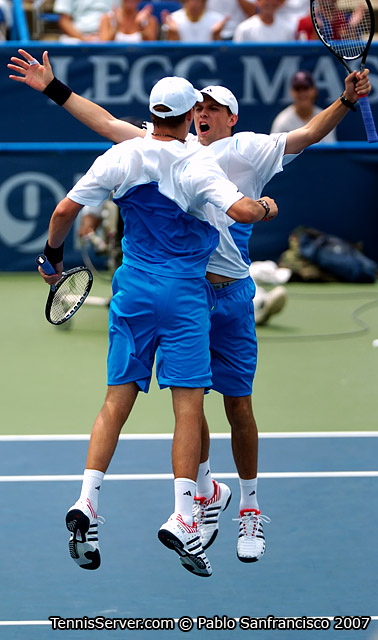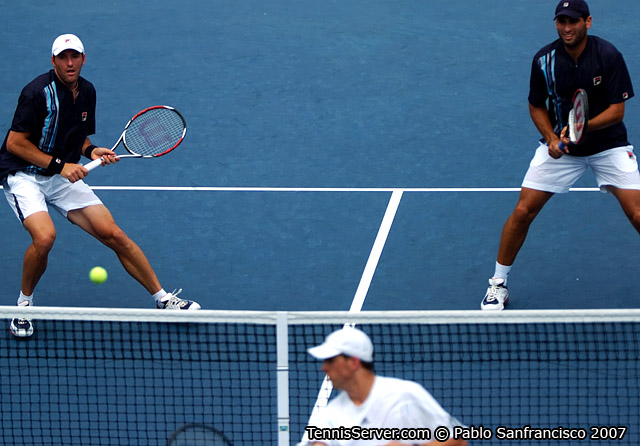August 5, 2007 Article Latest Between The Lines Article Between The Lines Archives:
Tennis Server
|

 |
by Ray Bowers with Photography by Pablo Sanfrancisco
The quality of the men's draw at this year's Legg Mason Classic was disappointing, as was the case at Indianapolis and Los Angeles--the two earlier events in the heavily promoted U.S. Open Series. Of the Top 24 players in the year-to-date race, only Andy Roddick and Tommy Haas were on hand here in Washington. A player scarcely noted, essentially without pro experience, became the main story of the event, a national sporting figure almost overnight. His amazing run made this year's tournament the most appealing in years. John Isner was well known to followers of intercollegiate tennis. He came to the Legg Mason as NCAA singles runner-up this spring after four years leading the University of Georgia team, the 2007 national champions. He arrived as a last-minute replacement after the withdrawal of Fernando Gonzalez. At 6-9 with high shoulders and aged 22, he looked like a basketball player.
I watched him on Tuesday afternoon against his first opponent, Tim Henman. Isner frequently clocked first-serve velocities in the 130-mph range to a maximum of over 140. For most of the first set, however, Henman appeared slightly superior in all departments other than in serving. The conditions were hot and humid, with little circulation inside the heatbox that was Stadium Court. Little by little, Isner reduced his episodes of inept play and began increasingly to find the edges with his potent forehand. He lost the first set, then recovered to take the second as Henman began to look less than fresh. The big serving by Isner intensified during the third-set tiebreaker, where the tall American closed out matters convincingly.
On Wednesday the pro rookie took on the tournament's #8 seed, Ben Becker. Both men were hard servers, though it was Isner's heavier serving weaponry that kept matters close. The critical mini-break in the third-set tiebreaker came on a magnificent all-court point, where Isner delivered a perfect baseline-sweeping lob and a scrambling Becker's lob reply fell just outside the lines. Isner closed out the tiebreak game (and the match) with two unreturned serves. Given Isner's obviously mature composure on the court, I was a little surprised at his animated manner during his post-match press conference. John chattered away telling how thrilling this week had been for him. He went on to explain that his ability to concentrate on each forthcoming point had not come easily to him, but that now he felt it was an important strength. On Thursday, John narrowly defeated the smallish lefty Wayne Odesnik, 21, in three tiebreak sets. Odesnik seemed by far the fresher toward the end, where John was now offering little resistance in Odesnik's serving games. But John took lots of time between points to summon his remaining strength to continue delivering service bombs. He closed out the match with two untouched service aces.
John's foe on quarter-final Friday was Tommy Haas, the tournament #2 seed, who had been out of action since his injury-related withdrawal at Wimbledon. Once again John's serve held up well, still measuring in the 120's and 130's and occasionally higher. His serves were especially difficult in their high bounces, produced by his unusually high point of launch. John finished the match with a total of 30 aces, Haas with 19. Tommy played with good confidence and self-control, and was usually satisfied to bunt back returns in hopes of initiating long exchanges, where Tommy's polished ground game was likely to prevail. Isner won the first set--the only time this happened all week--but Tommy stiffened to reach second-set tiebreak, which he won with some more authoritative service returns. The third-set tiebreaker was also a nailbiter. Servers lost only one point in the twelve points played in that game, but it was enough for another narrow victory by Isner. Once again, the tall American's resolve at critical moments seemed unquenchable.
Isner's Saturday night showdown with Gael Monfils, who had been brilliant in beating Safin in straight sets the previous date, gave the Stadium perhaps its most exciting match in years. John's weapons were at their best, and Monfils used his unmatched court mobility to answer much of John's net play, including many of the American's bids for drop-volley winners. But when forced to hit from deep court, which sometimes seemed his own preference, Gael's passing shots were too often inaccurate and also, rather frequently, softish. The drama unfolded as if by script. Sets one and two were split, both settled in tiebreakers. In the third set, the score reached five games all, where neither player had yet lost serve all evening. By then the evening cooling and rising humidity sapped some of the energy from both men's serves, and aces had become distinctly fewer. (For the night Monfils led in the count of aces, 25-23.) In the eleventh game of set three, Gael seemed at last atop John's big serves, and the French star delivered several strong returns thereby producing the first service break of the match. But needing only to hold service one more time, Gael became victim of tennis's signature bugaboo. John won the first point by coming forward behind his own return of serve--a tactic seldom tried by either player this night. Gael next double-faulted, falling behind love-30. He recovered to 30-all, but his first-serve then vanished, and John took over, closing out the game with another net charge. Thus yet another Isner match would end in a deciding tiebreaker. But the result now seemed predictable. John continued his recent aggressive tactics, winning seven of the game's nine points against a worthy but now forlorn opponent.
RODDICK AND ISNER Meanwhile Andy Roddick had a close call on Thursday night, an evening where he played neither his best tennis nor his worst. His opponent was Radek Stepanek, whose fine, aggressive play the previous date suggested that he was capable of making things difficult for Andy. For the most part the tennis was both attractive and evenly matched. Both men served and stroked with heavy weight, Andy's deliveries usually carrying somewhat the greater punch, and both were very willing, sometimes eager, to come forward on the attack, often behind an aggressive ground stroke and also occasionally directly behind serve. There were occasional spells of defensive exchange, where Radek seemed the more comfortable, and also quite a few episodes where both men moved each other back-and-forth and side-to-side, using the full court. Roddick won the first set behind a single break of serve, Stepanek the second behind two breaks. Through much of the third set, Stepanek seemed the slightly stronger player, attaining a break point in game five and two more in game nine. Andy survived these crises by producing his best. But Radek then faltered badly in game twelve, rather suddenly, when he produced two soft-backhand errors amid spells of extremely non-aggressive hitting.
Andy's other major hurdle was a large one, in the person of Ivo Karlovic, 6-10, a huge server with a potent net game and rapidly improving all-court skills. Andy managed to prevail in two tiebreak sets, both decided by a single-minibreak margin. Andy's serves carried the greater velocities, up to 151 mph--his fastest in several years, he afterwards said. Ivo's carried the advantage of his 6-10 height, so that Ivo won the count of aces, 19-12. An on-the-run backhand pass from deep behind baseline gave Andy the final minibreak. Andy afterwards explained that as he managed to nudge back his serve-return he immediately began running to the opposite corner of the court, appreciating that Ivo usually volleyed to the open court.
Looking to his final-round meeting with John Isner, Andy Roddick was now well warned of Isner's considerable strengths. Further preparation arose from Andy's semi-final match against Karlovic, whose 6-10 height and strengths in serving and at net almost identically mirrored those of Isner. Further, although Andy was not entirely fresh, his road to the Sunday final had been much easier than John's. There had been a first-round bye for Andy and then much shorter matches than John's. (John had also played a tough doubles match.) Further, most of Andy's play had been under the lights, away from the brutal midsummer Sun. His only daytime match had been the day before, Saturday, but that scheduling too had been to Andy's advantage, as it gave him more rest directly before the final than John, who played to near-exhaustion Saturday night. John admitted to tiredness on taking the court Sunday. Matters began encouragingly for Isner, who for several games picked up at the level he had shown all week. If the aces were a bit less forthcoming than before, the fine net attacking seen at the end against Monfils on Saturday night was sharper than ever. In Andy's second serving game, Andy slipped behind by a break point, and for a moment it seemed the impossible might indeed be unfolding. But Andy at once righted himself behind his own superb serving weapon. Minor trouble quickly ensued for John when he double-faulted to reach 30-all in the next game, but an ace overcame the moment. But two games later, John again serving, the rookie contributed two quick volleying errors, then an errant forehand, and finally another error at net--a lost serving game at love. Roddick then closed out the set firmly, losing only one point in his last three serving games. Isner seemed tired--nothing new there--but he still played with resiliency throughout the second set as both players held serves to reach tiebreak. Andy's forehand remained strong and reliable, keeping Isner on the move in rallies and helping collect the victory in the tiebreaker. Andy thus collected ranking points that, it would seem, should assure his seeding in the top four at Masters Series Cincinnati, following his immediate appearance at Montreal. Isner has accepted a wild-card invitation also to play at Cincinnati. His success against the stronger field there will tell much as to his likely future. An eventual place somewhere between, say, Justin Gimelstob and Pete Sampras (both of whom I greatly admire) seems safe to say. For the immediate present, his emergence adds an intriguing dimension to pro tennis, especially in America.
THE DOUBLES The 16-pair doubles draw looked attractive, including four members of the world's top ten along with several newcomer pairs and other interesting combinations. As play unfolded, all pairs played aggressively from start to finish. Everyone moved to net directly behind all serves, all pairs relentlessly threatened the center area of net, and all used the I-formation at least occasionally in order to compound the problems confronting serve-returner. Serves were usually forcing, and serve-returners answered with as much punch and variety as they could summon. There was absolutely no "one-up, one-back" doubles widely seen elsewhere, at least not by design. The speed of play meant that most shots and court movement were instinctive, within whatever tactic agreed upon by the partners prior to each serve.
The early doubles matches were generally played on outside courts, where crowd attendance and engagement was very good. It was pleasing that doubles were scheduled daily in the evening hours, as many fans arrived well after the customary 4 P.M. start of play. THE BRYANS AND THE OTHERS Has it been nine years since the twins, fresh from Stanford University, brought their refreshing energy and dazzling style of play in their debut here? Today, at age 29, the Bryans are at the peak of their profession--year-end holders of the world #1 ranking in 2005 and 2006 and currently well ahead in the 2007 year-to-date race. They have achieved the career Grand Slam, having won each Slam at least once, the Australian Open twice including in 2007. They have been enormously successful as Davis Cup stalwarts for their country. Theirs is a hard-hitting style combining power hitting, extreme aggressiveness in forecourt, and a probably unprecedented level of teamwork--assets that together define today's doubles at the highest level. It is tempting to start comparing their credentials with those of past champions as candidates for greatest-ever doubles pair. But early in the week I turned my attention to the others. I watched the departure of the pair Butorac-Murray, who earlier this year scored an overall W-L record of 8-2 in the grass-court events at Queens, Nottingham, and Wimbledon. Jamie Murray at 21, is the slightly older brother of Andy Murray. Eric Butorac, 26, is from Minnesota. Both are lefties--tallish, pleasant in court manner, both of them firm servers and serve-returners. Murray was the more impressive in his quickness and confidence. Now, they split the first two sets against opponents Wes Moodie and Todd Perry. Moodie-Perry then won the match tiebreak game used in doubles instead of a third set. Moodie, Wimbledon doubles champion in 2005, seemed the dominant server, returner, and threat at net. Also disappointing was the Stanford University pair Jason Lipsky and David Martin, who had reached the final at Indianapolis the previous week against the Bryans and had beaten Butorac-Murray at both Los Angeles and Indy this summer. I had admired their play on tv, but on this date matters went poorly for them. Against opponents Ben Becker and Igor Kunitsyn, the Stanford boys, especially Martin, who is lefty, showed their quickness of foot and hand. In picking serve-return roles, they put both forehands in the middle. (i.e., Martin returned from the deuce court.) The Americans won the first set by 61, lost the second by identical score, and then lost the match tiebreak game by the narrowest of margins, showing extreme disappointment at losing. It seemed to me that they had become unhinged by the very heavy hitting of Becker after the first set. Mahesh Bhupathi and Tim Henman made an intriguing pair, though they lost in the second round to seeded Hanley-Ullyett. Mahesh's soft hands in volleying and stroking were unmistakable, but the former champion as partner of Paes and later Mirnyi seemed to make as many errors and mistakes as his singles-artist partner, Henman. Tim was clearly out of place amid the ferocious net play against Hanley-Ullyett, but he otherwise contributed fairly well. Also interesting were Chris Haggard and Ivo Karlovic, who nearly defeated seeded pair Martin Damm and Leander Paes in the second round. Haggard, another lefty, brought quickness and ingenuity to the partnership, very well supporting his dominating partner. Paes had been brilliant in the first round against Isner and his NCAA conqueror Dev Varman (from University of Virginia), having almost single-handedly denied the collegians the victory. Haggard-Karlovic were better prepared for Leander's flare at net, but not quite enough to claim the victory. The four seeded pairs all made their way to the semis, where Damm-Paes faced the fine Israeli pair Jonathan Erlich and Andy Ram. The Israelis played good, tight tennis--quick at net, technically solid. Damm provided the heavier serving and hitting roles from the ad court, Ram the same for his pair. The match tiebreak was one-sided, the Israelis contributing no mistakes. Martin Damm made several errors, in one case expecting his partner to pounce on a softish serve return at mid-net. Both pairs used the I formation heavily whenever matters became critical, including in the match tiebreak. Erlich-Ram thus earned a place in the final against the brothers, who won one-sidedly over Hanley-Ullyett in their semi.
The Sunday final was evenly contested, the brothers clearly below their form of the previous evening. Mike Bryan contributed a poor serving game early, a gift returned later in the first set by Erlich. The set-ending tiebreak game reached five points all, whereupon Andy Ram mistakenly decided against hitting an opponent's shot that barely grazed the baseline. The Bryans then closed the set with a serve-and-putaway. The Israelis broke early in set two, Bob Bryan seemingly slow in reacting to an attackable ball at net. Midway in the concluding match tiebreak game, Erlich errored, and the visitors never equalized. It had been a tepid match, the crowd gradually filling, with relatively few extended points. Critical mistakes rather than sparkling play seemed to decide the outcome. But for the brothers, it was the third consecutive triumph here in Washington, with prospects ahead excellent for success in Montreal, Cincinnati, and at Flushing Meadow.
Best wishes to all for more great tennis before New York.
--Ray Bowers Extensive additional photography from the Legg Mason Tennis Classic is available in the Tennis Server Pro Tennis Showcase.
1995 - May 1998 | August 1998 - 2003 | 2004 - 2015
This column is copyrighted by Ray Bowers, all rights reserved.
Following interesting military and civilian careers, Ray became a regular
competitor in the senior divisions, reaching official rank of #1 in the 75
singles in the Mid-Atlantic Section for 2002. He was boys' tennis coach for four
years at Thomas Jefferson High School for Science and Technology, Virginia, where
the team three times reached the state Final Four. He was named Washington
Post All-Metropolitan Coach of the Year in 2003. He is now researching a history
of the early pro tennis wars, working mainly at U.S. Library of Congress. A
tentative chapter, which appeared on Tennis Server, won a second-place award
from U.S. Tennis Writers Association.
Questions and comments about these columns can be directed to Ray by using this form.
|



October 2022 Tennis Anyone: Patterns in Doubles by John Mills. September 2022 Tennis Anyone: Short Court by John Mills. |
 You will join 13,000 other subscribers in receiving news of updates to the Tennis Server along with monthly tennis tips from tennis pro Tom Veneziano.
You will join 13,000 other subscribers in receiving news of updates to the Tennis Server along with monthly tennis tips from tennis pro Tom Veneziano. 

